- Home
- T. Kingfisher
The Twisted Ones
The Twisted Ones Read online
Thank you for downloading this Simon & Schuster ebook.
Get a FREE ebook when you join our mailing list. Plus, get updates on new releases, deals, recommended reads, and more from Simon & Schuster. Click below to sign up and see terms and conditions.
CLICK HERE TO SIGN UP
Already a subscriber? Provide your email again so we can register this ebook and send you more of what you like to read. You will continue to receive exclusive offers in your inbox.
Publisher’s Notice
The publisher has provided this ebook to you without Digital Rights Management (DRM) software applied so that you can enjoy reading it on your personal devices. This ebook is for your personal use only. You may not print or post this ebook, or make this ebook publicly available in any way. You may not copy, reproduce, or upload this ebook except to read it on your personal devices.
Copyright infringement is against the law. If you believe the copy of this ebook you are reading infringes on the author’s copyright, please notify the publisher at: simonandschuster.biz/online_piracy_report.
For my own two daft hounds
1
I am going to try to start at the beginning, even though I know you won’t believe me.
It’s okay. I wouldn’t believe me either. Everything I have to say sounds completely barking mad. I’ve run it through my mind over and over, trying to find a way to turn it around so that it all sounds quite normal and sensible, and of course there isn’t one.
I’m not writing this to be believed, or even to be read. You won’t find me at a book festival, at a little table with a flapping tarp over it, making desperate eye contact with passersby—“Want to read a true story of alien abduction? Want to know the secrets of the universe? Would you like to find out the real truth about the transmigration of souls?” I won’t shove a glossy, overpriced book with badly photoshopped cover art at you, and you won’t have to suffer through my lack of a proofreader.
Truth is, I don’t even know who you are.
Maybe you’re me. Maybe I’m just writing this to get it all out of my head, so that I can stop thinking about it. That seems likely.
All right. I meant to start at the beginning, and already I started babbling about disclaimers and people writing books about crystal power and the secrets hidden in the Nazca Lines.
Let me start again.
My name’s Melissa, but my friends call me Mouse. I can’t remember how that started. I think I was in grade school. I’m a freelance editor. I turn decent books into decently readable books and hopeless books into hopeless books with better grammar.
It’s a living.
None of that’s particularly relevant. The important bit to know is that my grandfather died before I was born, and my grandmother remarried a man named Frederick Cotgrave.
Honestly, I don’t know how she managed to get married once, let alone twice. My grandmother was a nasty, vicious woman. Mean as a snake, as my aunt Kate used to say, which is pretty unkind to snakes. Snakes just want to be left alone. My grandmother used to call relatives up to tell them it served them right when their dog died. She was born unkind and graduated to cruel early.
But I guess a lot of cruel people can pretend to be sweet when it suits them. She married Cotgrave and they lived together for twenty or thirty years, until he died. Every time I went over there, she was snipping at him—snip, snip, snip, like her tongue was pruning shears and she was slicing off bits for fun. He never said anything, just sat there and read the paper and took it.
I never did figure it out. These days, when we know a lot more about abuse, I like to think I’d speak up, say something, ask him if he was okay. But then again, people get into relationships and sometimes they stay there, and for all I know, he got something out of it that the rest of us weren’t privy to.
Anyway, I was a kid for most of it, so it just seemed normal. He was my… stepgrandfather? Grandfather-in-law? I’m not sure which.
That bit galls me to no end. I feel like if he’d been my real grandfather, I would have… oh, not deserved what happened, maybe, but owned it a little. Even if Cotgrave and I had a relationship like a granddad and his granddaughter, I’d have said, okay, maybe I owe him this. But it’s not like he ever took me fishing or taught me how to fix a car engine or whatever bullshit grandfathers are supposed to do. (I don’t know. I didn’t have one on the other side either. My maternal grandmother was a widow, but she didn’t remarry and she spent a lot of time giving money to televangelists and telling other people about Jesus. She also believed in crystal power and aliens, come to think of it, pretty much the same way she believed in Jesus, and never saw any contradiction in the two. People are complicated.)
All I remember about Cotgrave was an old man with no hair, reading the paper and getting snipped at. My dad said he could play a really cutthroat game of cribbage. Maybe that’s why my grandmother wanted to marry him, for his sexy cribbage game. Hell if I know.
The only other thing I remember about him was the sound of a typewriter. He couldn’t type very fast, but I’d hear the noise from his “study,” which was a back bedroom with ratty carpet. Clack. Clack. Plonk. Clack. Screech of carriage return. Clack.
I don’t know when or how he died. I was in college and dead broke and nobody thought I’d come back for the funeral. We weren’t big on funerals in my family. I know some families have these massive orgies of grief, where all the third cousins come back and sob over the casket, but we’re not like that. Everybody gets cremated and then somebody takes the ashes, and after they’ve sat around on the mantelpiece long enough to get creepy, they get dumped in the ocean, and that’s the end of that.
Cotgrave had a funeral, I guess, or a memorial service or something. Aunt Kate told me that a bunch of weird people showed up. “Such odd people,” she said. “I think he might have been in one of those societies. You know, like the Elks or the Freemasons or whatever. They weren’t rude, just odd. Your grandmother was pissed.”
“Grandma’s always pissed.”
“Well, you aren’t wrong.”
Now, of course, I wish I’d known more about the odd people. But I doubt Kate knew anything. She probably talked to all of them and got their life story—she had that ability—but she would have forgotten it as soon as she heard it. Kate was a wonderful sounding board, because she had a memory like a sieve. You could tell her anything you wanted in confidence, and odds were good she wouldn’t remember it an hour later. I lived with Aunt Kate after Mom died, and she really did her best to remember things like doctor visits and parent-teacher conferences, but she wasn’t always great about that either.
Anyway, fast-forward a decade and some change later, and my grandmother finally died. She was a hundred and one. There’s a line of poetry I always think of, though I can’t remember who said it. “The good die first / and they whose hearts are dry as summer dust / burn to the socket.”
Grandma burned to the socket, all right. I didn’t go to that funeral, either. Actually, I don’t think there was one. Dad didn’t have the energy anymore. He wasn’t dying or anything, but he was old—he’d been over forty when I was born, and he was eighty-one now—and he just couldn’t deal with it.
“Not much point, is there?” he said on the phone. “The only reason anyone would show up was to make sure she was actually dead.”
I laughed. Dad didn’t have any illusions about his mother. I still remember when I was young and Mom had just died and he’d asked Grandma to babysit. I marched in that evening and crawled into his lap and informed him that she was mean and I didn’t like her at all.
In another family, I might have been told that I loved my grandmother and was a naughty child. But my father only sighed and rubbed his forehead and said that yes, he
knew what she was like, but he didn’t have any other options. He took me to the library that weekend so that I could read in my room, and after a few months of that, I went to live with Aunt Kate.
After I’d finished laughing—not that it was funny, but it was true—I stayed on the line and listened to Dad breathe too hard. His lungs were probably going to be what killed him. They were only a little creaky right now, but you could hear it coming, a rasp down at the bottom that was going to turn into emphysema or pneumonia or just erupt one day into full-blown stage-four lung cancer, no matter how many times the doctors swore that he was clear.
“Her house has been locked up for two years,” he said finally. “Mouse, I can’t handle it. I hate to ask.… It’s a shit job, and I know it. I think there’s a storage unit too. Somebody’s gotta clear them out.”
“Sure,” I said, doing frantic mental math about the projects I was working on and how soon I could wrap them up. “Okay. I’ll go down.”
“You sure? It’ll be a mess.”
“It’s okay.”
Dad never asked me for anything, which is why I would have done anything for him.
He sighed. “If there’s anything worth keeping, keep it, or sell it and keep the money. I just want it… dealt with.”
“Are you planning on selling the house?”
He made a short little barking sound that was a laugh or a cough or halfway between the two. “I will if it’s in any condition to sell. It wasn’t good when we put her in the home. It might be really bad. If you get in and it’s a disaster, tell me and I’ll pay for contractors to go in and strip the place down to studs.”
I nodded on the other end of the line. He couldn’t see me, but he could still probably guess. Dad and I had talked on the phone every week since I went to live with Aunt Kate, even in the days when that meant he was paying through the nose for long distance. To this day I think we’re still more comfortable talking on the phone than in person.
Gah. I don’t know why I’m telling you all these details. None of this matters, except maybe the odd people at the funeral.
I wish I knew if there was some reason to write all this down—if including every little detail will make for a better exorcism of the events from my mind, or if I’m just stalling to avoid getting to the hard parts. Like the stones.
I still don’t know how I’m going to explain about the stones.
But I don’t have to write about those just yet, so I’ll just hope that my subconscious knows what it’s doing.
One of the ironies of this situation is that I actually remember thinking, Well, the old bat did me a favor at last.
It was a good time for me to get out of Pittsburgh. I’d had a relationship end rather badly, and—oh, you know how it is. You’re gritting your teeth when you see them together in public and insisting that you’re still friends, while thinking you cheating sonofabitch behind your eyes and you know that there’s a very good chance that you’re going to start behaving badly.
So I put my dog in the truck and packed up a suitcase full of clothes, asked my aunt Kate to keep an eye on the house, and drove down to North Carolina.
It’s a long drive. It’s pretty, actually, if you go through West Virginia, but of course then you’re in West Virginia. Lots of deep mountain “hollers,” and I guess the etymologists are still fighting over whether the word comes from hollow, which would make sense, or hollerin’, which is a folk-art form where people yodel at one another.
I stopped regularly, both because I was drinking a lot of coffee and to take Bongo out. Bongo’s a redbone coonhound, and he was named after the antelope, not the drum. They’re the same color, and if you’ve ever seen a coonhound run, they bound like an antelope, hence, Bongo.
I have had to explain this more times than I can count.
Bongo’s a rescue. I got him as an adult and he’s starting to go a bit white around the muzzle now. He’s not that smart, but he can detect if a squirrel passed by at any point in the last millennium. There’s a tree in the backyard that he chased a possum up once, and he has visited it faithfully every day for the last two years, on the off chance that the possum has come back.
I have no idea what he’d actually do if he caught a possum—lick it to death, probably. Coonhounds usually get dumped when they turn out not to be very good hunters. Bongo is an excellent watchdog, by which I mean that he will watch very alertly as the serial killer breaks into the house and skins me.
But if the UPS guy ever tries to put one over on us, Bongo’s on the case. If dogs had religion, Satan would be the UPS guy.
(Yes, I own a hound dog and a pickup truck. No, I don’t have a gun rack on it. I fired a BB gun once in Girl Scouts. It went bang and made my hands hurt and that was the end of that.)
Anyway. It’s technically a ten-hour drive, but it takes about twelve when you have a dog and an overactive bladder. We ate at drive-throughs. Bongo got a cheeseburger, which made him think that he was in heaven. (It seems very unlikely that my vet will ever read this, but just in case, this was highly unusual and I do not actually feed him scraps from the table on a regular basis.)
I stayed at a motel that night. I didn’t want to face whatever might be in my grandmother’s house—squatters, or hoarding, or feral cats, or whatever—after a long drive. Dad said he’d had the power turned back on. No Internet, but that’s why God invented cellular data plans.
I wish I could remember what that night was like. I think it was the last one where I was standing over here, with you, on the normal side, and not over there, in that other place, with the white people and the stones and the effigies. And Cotgrave, of course.
But I don’t remember it. It was just one more generic night at a motel. Bongo probably started the night on the other bed, then oozed over and flopped onto my feet, but that’s more because I know what Bongo’s like than because I remember it. (He’s flopped over my feet right now, as I’m typing. Occasionally he looks up sadly at me. It’s a lie; he’s happy as long as he gets fed and people pet him. I wish I were a dog. One of the simple ones, like hounds. Border collies are too complicated. I suspect if I had owned a border collie, this story would have a very different ending, and I probably would not have been around to type it up. But I had Bongo, and he saved our lives because he is simple and made of nose.)
I’m getting ahead of myself again. I’m sorry.
The next morning, I got up and went to go see what kind of mess my grandmother had left behind.
2
“Oh shit,” I said.
I said it a couple of times. There was no human around to hear me.
Then I let the screen door slam shut and turned around and sat down on the steps of the deck.
Grandma had lived about thirty minutes out of Pondsboro, which is southwest of Pittsboro, which is northwest of Goldsboro, because nobody in the late 1700s could think of an original name to save their lives.
North Carolina’s a weird state, because there are all these roads that are framed by trees, and so you literally do not know how remote the area is. You’re just driving through trees. The woods, once you cut them down, grow up again in a dense tangle of kudzu and buckthorn and honeysuckle and loblolly pines. You can’t see through them. At any given moment, you could be surrounded by a thousand acres of uninhabited woods, or you could be thirty feet from a business park full of IT professionals. There’s no way to tell.
Get out around Pondsboro, and you’re more likely to be near the thousand acres of woods. There’s some weird little dips in the landscape—not full hills exactly and nothing you’d call a holler, but things fold over on themselves and wrinkle up and you get weird little bluffs cut by things that are a creek in Pittsburgh and a crick down here. (I usually just call it a stream to save argument.)
Grandma’s house hadn’t been that remote when she’d bought it. There had been a couple of farm families nearby and a pack of hippies across the road. But people left the farm for the city, and the pastures grew up into the
tangle of woods I mentioned before, and the hippies got old and most of the kids moved out. I saw a car parked over there when I drove up, but that doesn’t mean anything in the South. It wasn’t up on blocks, though, so maybe someone was still living there.
She’d had nothing kind to say about the hippies, but that was no surprise.
I’d passed one or two trailers on the way up, and there might be more back in the woods. For all I know, I could be surrounded by people.
Sitting on a dead woman’s porch, though, I didn’t much feel like it. I felt like the only other living person on earth was my dad, up north, and the world was empty except for the two of us who had to deal with what my grandmother had left behind.
Bongo was still in the truck. He stuck his head out the window and whined.
I sighed.
I haven’t described the house yet, have I? I probably should.
It was a big old Southern rambler, with a red tin roof. The tin roof was in good shape and the walls were solid, but the white paint was starting to wear off. You could see bits of wood under it. The wraparound porch was weathered gray wood and the steps creaked when I walked on them. There was a carport, but no garage. Somebody had filled the back of the carport with firewood a long time ago. The whole carport had slumped like a badly made cake. I didn’t even think about parking my truck in it.
The underside of the porch roof was painted pale blue. “Haint blue,” they call it. The theory is that if a ghost comes up to the door, it’ll look up and see the blue ceiling and think it’s the sky, and drift up into it. I don’t know how that’s supposed to work. But I’ve also heard that it’s supposed to fool wasps the same way, so maybe wasps and ghosts are getting muddled up there. You don’t want either nesting in the porch, anyhow.
Because it’s the South, there was a thin layer of green algae on all the vinyl surfaces, around the edges of the windows and whatnot. There were long squiggly lines etched through the green, where the slugs had crawled at night. There’s not much you can do about either one, except scrub things off with bleach occasionally.

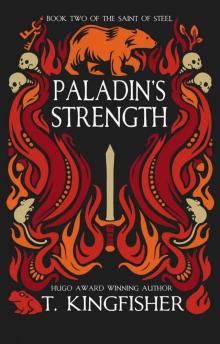 Paladin's Strength
Paladin's Strength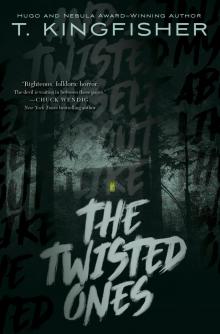 The Twisted Ones
The Twisted Ones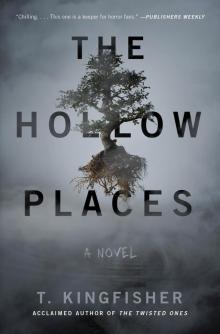 The Hollow Places
The Hollow Places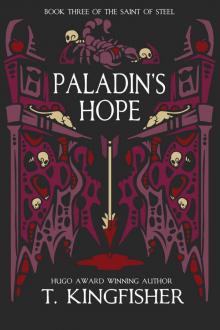 Paladin’s Hope: Book Three of the Saint of Steel
Paladin’s Hope: Book Three of the Saint of Steel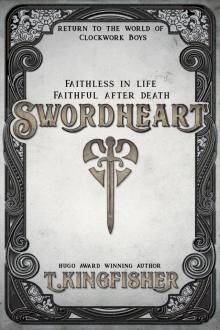 Swordheart
Swordheart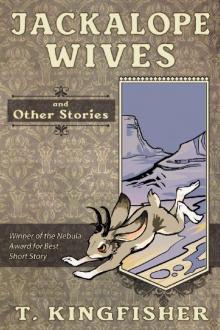 Jackalope Wives And Other Stories
Jackalope Wives And Other Stories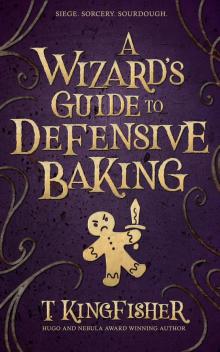 A Wizard's Guide to Defensive Baking
A Wizard's Guide to Defensive Baking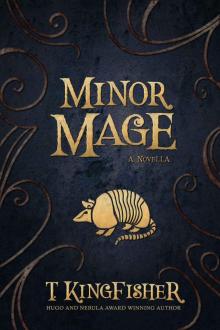 Minor Mage
Minor Mage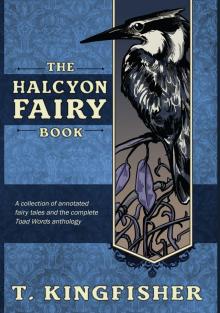 The Halcyon Fairy Book
The Halcyon Fairy Book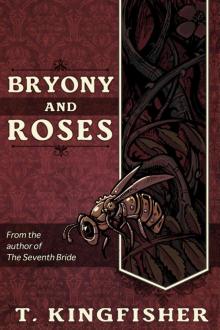 Bryony and Roses
Bryony and Roses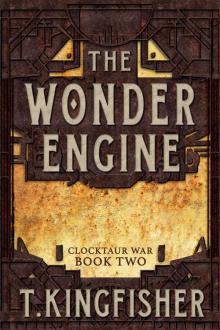 The Wonder Engine_Book Two of the Clocktaur War
The Wonder Engine_Book Two of the Clocktaur War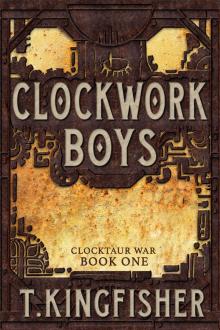 Clockwork Boys: Book One of the Clocktaur War
Clockwork Boys: Book One of the Clocktaur War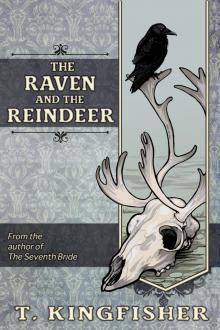 The Raven and the Reindeer
The Raven and the Reindeer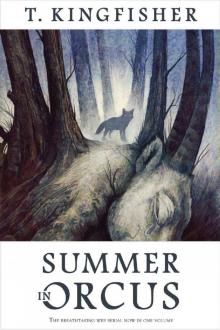 Summer in Orcus
Summer in Orcus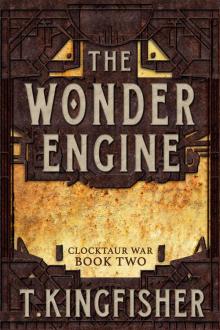 The Wonder Engine
The Wonder Engine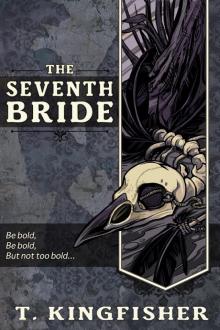 Seventh Bride
Seventh Bride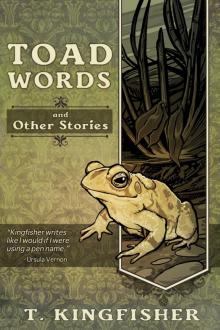 Toad Words
Toad Words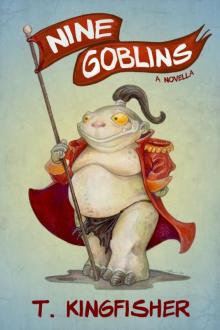 Nine Goblins
Nine Goblins